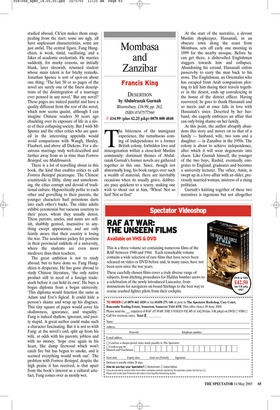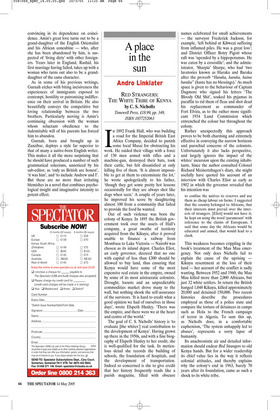Mombasa and Zanzibar
Francis King
DESERTION by Abdulrazak Gurnah Bloomsbury, £16.99, pp. 262, ISBN 0747577560 ✆ £14.99 (plus £2.25 p&p) 0870 800 4848 The bitterness of the immigrant experience, the tumultuous coming of independence to a former British colony, forbidden love and miscegenation within a close-knit Muslim community: dominant themes of Abdulrazak Gurnah’s former novels are gathered together in this one. Since, though not abnormally long, his book ranges over such a wealth of material, there are inevitably occasions when its usually grave, deliberate pace quickens to a scurry, making one wish to shout out at him, ‘Whoa! Not so fast! Not so fast!’ At the start of the narrative, a devout Muslim shopkeeper, Hassanali, in an obscure town along the coast from Mombasa, sets off early one morning in 1899 for the nearby mosque. Before he can get there, a dishevelled Englishman staggers towards him and collapses. Abandoning his errand, Hassanali enlists passers-by to carry the man back to his store. The Englishman, an Orientalist who has escaped from Arab companions plotting to kill him during their travels together in the desert, ends up convalescing in the house of the district officer. Having recovered, he goes to thank Hassanali and so meets and at once falls in love with Hassanali’s sister. Deserted by her husband, she eagerly embraces an affair that can only bring shame on her family.
At this point, the author abruptly abandons this story and moves on to that of a family — husband, wife, two sons and a daughter — in Zanzibar in the 1950s. The colony is about to achieve independence, after which it will soon degenerate into chaos. Like Gurnah himself, the younger of the two boys, Rashid, eventually emigrates to England, graduates and becomes a university lecturer. The other, Amin, is swept up in a love-affair with an older, previously married woman, mistress of a rising politician.
Gurnah’s knitting together of these two narratives is ingenious but not altogether convincing in its dependence on coincidence. Amin’s great love turns out to be a grand-daughter of the English Orientalist and his African concubine — who, after she has been abandoned by him, is suspected of ‘living dirty’ with other foreigners. Years later in England, Rashid, his first marriage having failed, takes up with a woman who turns out also to be a granddaughter of the same character.
As in some of his previous writings, Gurnah etches with biting incisiveness the experiences of immigrants exposed to contempt, hostility or patronising indifference on their arrival in Britain. He also beautifully conveys the competitive but loving relationship between the two brothers. Particularly moving is Amin’s continuing obsession with the woman whom reluctant obedience to the indomitable will of his parents has forced him to abandon.
Gurnah, born and brought up in Zanzibar, deploys a style far superior to that of many a native-born English writer. This makes it all the more surprising that he should have produced a number of such grammatical solecisms, unnoticed by his sub-editor, as ‘only us British are honest’, ‘it was him’, and ‘to include Andrew and I’. But these are no more than irritating blemishes in a novel that combines psychological insight and imaginative intensity to potent effect.



































































 Previous page
Previous page